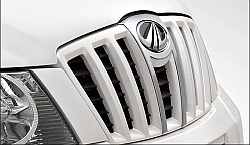 | « Back to article | Print this article |
Soaring fuel costs and its expected scarce availability in the future has led utility vehicle market leader Mahindra & Mahindra to explore opportunities in the unconventional space powering new vehicles, such as sports utility vehicles (SUV) and mini cars. The Mumbai-based company is simultaneously working on concepts such as full hybrids, battery-powered powertrains, bio-diesel, fuel-cells and hydrogen-powered engines. Some of these vehicles will be ready for launch by 2015, according to the company whose 99 per cent of products are driven by diesel engines today.
The Mumbai-based company is simultaneously working on concepts such as full hybrids, battery-powered powertrains, bio-diesel, fuel-cells and hydrogen-powered engines. Some of these vehicles will be ready for launch by 2015, according to the company whose 99 per cent of products are driven by diesel engines today.
These research and development works are in addition to the parallel work carried out on its future range of diesel engines. The company was also experimenting on smaller petrol engines, though their real-life application will depend on its practicality, said a senior official of the company.
Pawan Goenka, president (automotive and farm equipment sectors), Mahindra & Mahindra, said, "We are developing the powertrain for the next generation electric car to be developed and sold under the Reva brand. In addition, there are over 40 people working on the full-fledged hybrid vehicle project. We are also working partners for biofuels and hydrogen-powered vehicles".
The company on Wednesday formally inaugurated the Rs 650-crore (Rs 6.5-billion) R&D centre in Chennai christened Mahindra Research Valley (MRV), where all the developmental work of auto and tractor ranging from engine development to the development of prototypes will be carried out.
Most of the experiments on conventional and non-conventional fuel-driven vehicles will be done at the MRV, including hybrids. So far, no Indian company has launched a full hybrid vehicle in the market.
A hybrid vehicle is powered by two different sources of energy -- a traditional combustion engine (could be of petrol or diesel) and an electric motor. This twin combination of energy results in higher fuel efficiency and lesser emission.
M&M is keen to tap into the void of complete absence of diesel electric hybrid in the market today. Germany's Volkswagen will be the first company this year to launch a range of diesel electric hybrids in the world market.
Though hybrid vehicle technology is expensive, M&M is confident of bringing down costs with indigenous designs produced at lower costs and smart use of substitute materials more abundantly available within the country.
"We have sold 30,000-40,000 units of the micro hybrid versions of the Scorpio, Bolero, Xylo and XUV. Full hybrid technology is not easy to develop and we are working with an international company for it," added Goenka.
M&M is working with Gurgaon-based company Earth-100 Biofuels, which has helped it run its vehicles on 100 per cent biofuel or B100. Biodiesel is made from renewable natural resources that do not produce harmful byproducts. Made from vegetable oil, it is cost-efficient and easy to make and use.
Speaking about the new centre MRV, Goenka said, "Most of the things we had to outsource to Automotive Research Association of India will now be done in-house. The MRV will become the hub of our R&D activities. Except for the design work, which will stay in Mumbai, all other work is shifted to Chennai."
The MRV has engine development centre, a noise vibration and harshness lab, a fatigue test lab, a driveline development centre and an electrical and electronic lab.